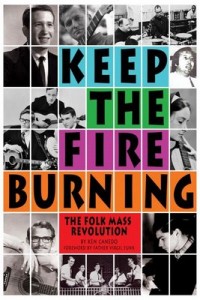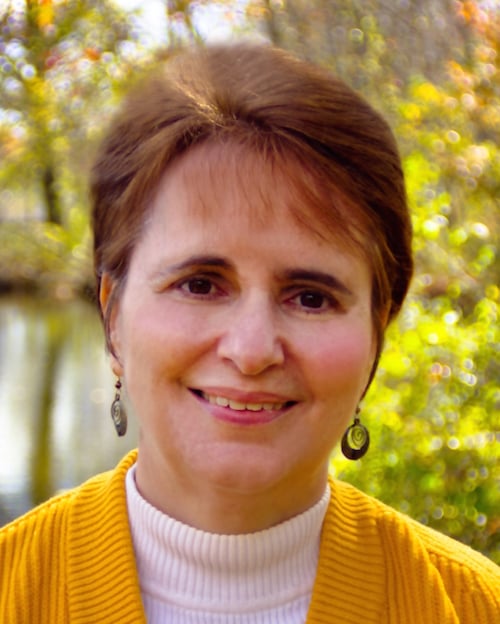 Ken Canedo, a liturgical composer, is the editor of the SpiritandSong.com blog and writes regularly for Today’s Liturgy magazine. He has written an important work on what he calls "the folk mass revolution" with his debut book, Keep the Fire Burning. At first glance, this book looks like a quick and easy read but don’t be fooled: Canedo has packed each of the 140 pages with fascinating research, history and very human stories on a period in the Catholic Church which surprisingly, few have written about. Keep the Fire Burning is much more than a book about the folk mass. It is a history of the amazing transitions the Catholic Church went through before and after Vatican II during one of the most turbulent decades in recent American history.
Ken Canedo, a liturgical composer, is the editor of the SpiritandSong.com blog and writes regularly for Today’s Liturgy magazine. He has written an important work on what he calls "the folk mass revolution" with his debut book, Keep the Fire Burning. At first glance, this book looks like a quick and easy read but don’t be fooled: Canedo has packed each of the 140 pages with fascinating research, history and very human stories on a period in the Catholic Church which surprisingly, few have written about. Keep the Fire Burning is much more than a book about the folk mass. It is a history of the amazing transitions the Catholic Church went through before and after Vatican II during one of the most turbulent decades in recent American history.
Keep the Fire Burning brought back so many wonderful memories for me, a baby boomer, folk music lover, and longtime participant in the folk mass/contemporary music movement. I was flooded with fond remembrances of the Latin mass, and the exciting transition to the English (or vernacular language) liturgies we have today. I also revisited with great pleasure how much folk music meant to me during the sixties and seventies, music which I totally embraced in my singing and playing as a Catholic artist. The folk mass played a vital role in my teen years, introducing me to lifelong friends, and my husband of now 30 years.
I had expected a wonderful, nostalgic read but Keep the Fire Burning proved to be so much more. Ken Canedo lay the ground work for what was to become the folk mass by reviewing the history of reform (and how it affected music) in the Roman liturgy. Canedo takes this history and weaves it through the lives of people who were the movers and shakers in the reform movement, some of whom eventually became key players in the folk mass revolution.
Yet, there is still more. While Vatican II and the liturgical reform movements were both vital to the birth of the folk mass, Canedo also takes much time to explore the social and political movements taking place in the fifties and sixties, and the rise of folk music as a means of voicing concerns about social justice. This social justice theme along with the influences of folk music legends such as Pete Seeger, The Kingston Trio, Bob Dylan, and Peter, Paul and Mary can be clearly heard in the early folk mass music of composers such as Ray Repp, Jack Mifferton, the Dameans and Carey Landry.
Keep the Fire Burning is not just a book to read, but is also a series of podcasts which allow you to actually hear the music. Canedo narrates the series, found at www.kencanedo.com, where there is an episode for each chapter. Since Canedo worked in the early 1970s for the now defunct FEL Publications (the first company to publish and market folk songs for the mass), he has access to many rare cuts of music which you will never hear anywhere else. The historical value alone is worth the listen.
Why should you read Keep the Fire Burning? The Folk Mass revolution has had far-reaching implications both inside and outside the Catholic Church, including laying the groundwork for the Contemporary Christian music industry, and giving a powerful voice to social justice issues in the Church. In keeping with the nature of secular folk music, Catholic folk music (now known as Contemporary music) was controversial in its time and is still so today. A resurgence of interest in Gregorian chant, traditional polyphony, and the Latin mass (with the reinstitution of Tridentine Mass by Pope Benedict XVI in 2007) stirs the controversy all the more, making Keep the Fire Burning a necessary read on the motivation, history and heritage of modern Church music.
Reading Keep the Fire Burning lit a fire in me, reviving my appreciation for both the Latin and vernacular masses, and the history behind them. It also gave much needed legitimacy to the folk mass movement which, in turn, affirmed my own music ministry as a liturgical song leader and Catholic recording artist.
My only complaint was that I wish Canedo had written more! The book ends just before getting into the era of the St. Louis Jesuits. Canedo has promised that there is more to come.
Keep the Fire Burning is a must read for any person involved with Catholic music, whether it be in traditional or contemporary liturgical music, or in the para-liturgical expressions found in acoustic gospel, rock, pop, hip hop and rap. Published by Pastoral Press, you can purchase your copy at http://www.ocp.org/products/6152. Listen to the podcasts at www.kencanedo.com.
Copyright 2009 Susan Bailey
About the Author

Susan Bailey
Susan Bailey is the author of River of Grace: Creative Passages Through Difficult Times (Ave Maria Press), and Louisa May Alcott: Illuminated by The Message (ACTA Publications), part of their Literary Portals to Prayer series. Along with her blogs Be as One and Louisa May Alcott is My Passion, Susan writes for the Diocese of Worcester newspaper, The Catholic Free Press.


.png?width=1806&height=731&name=CatholicMom_hcfm_logo1_pos_871c_2728c%20(002).png)
Comments